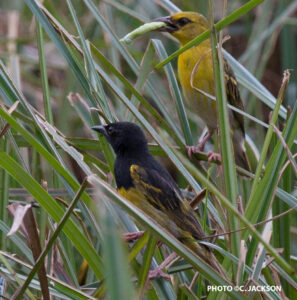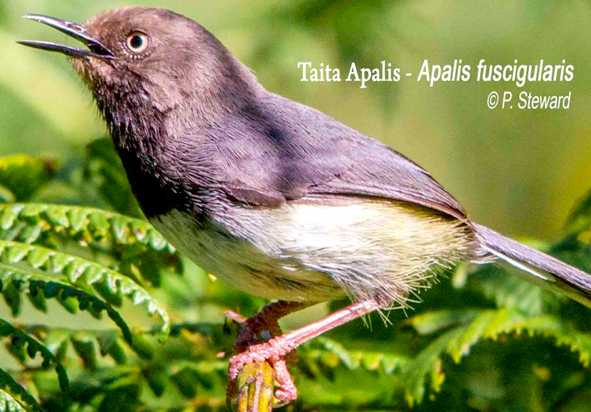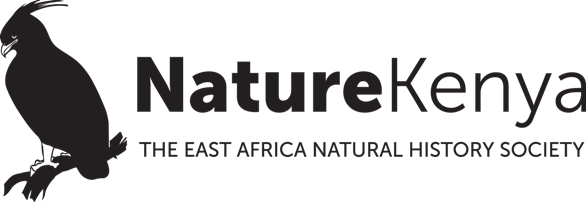Support us
Appeals
Appeals
Help us save species and protect habitats. Support our appeals.
From once in a lifetime opportunity to do something amazing for conservation, to urgent requests for donations to save a threatened species or protect a habitat, you can help Nature Kenya achieve positive change for nature and people.
Find out about our efforts to save species and protect sites and habitats. You'll be amazed by the range of campaigns and appeals you can get involved in.
A bird found only in one county in one country on one continent – can you help save its breeding sites?
The Clarke’s or Kilifi Weaver is classified in the IUCN Red List as Endangered. This bird is endemic to the coastal forests of Kenya in Arabuko-Sokoke forest and Dakatcha Woodland. It has a small range – Kilifi County – within which its forest habitat is being cleared for cultivation and charcoal. Its very small population is declining.
The only place on earth where it is known to breed is the seasonal wetlands of Dakatcha Woodland.
Securing Dakatcha Woodland, acre by acre, is the best action to ensure the survival of the Clarke’s or Kilifi Weaver and other unique wildlife occurring inside the Dakatcha Woodland Key Biodiversity Area.
Nature Kenya is seeking your help to raise funds to purchase 800 acres in Dakatcha Woodland for conservation.
Saving Clarke’s Weaver’s breeding sites will also protect other endangered coastal endemics: Sokoke Scops Owl, Sokoke Pipit and Golden-rumped Sengi (elephant-shrew).
The Dakatcha forest is important for the local people. The wooded hills are a vital water catchment area for surrounding villages. The trees and shrubs provide traditional medicine and the grassy glades support grazing cattle. The forest sequesters carbon, reduces soil erosion and moderates the local climate.
The 800 acres we seek to purchase will become a protected nature reserve, and neighbouring communities will be helped to farm sustainably. Let’s act NOW before it’s too late. Donate to protect the Clarke’s Weaver’s natural habitat!
Donating via Mpesa (Pay bill No:100300, Account Name:Dakatcha).
About Nature Kenya and the land purchase initiative
Established in 1909, Nature Kenya - the East Africa Natural History Society – is Africa’s oldest conservation society. Our mission is to connect people with nature and take action for biodiversity conservation. Saving species is one of our four strategic pillars. Preserving the natural habitats of threatened species can ensure their survival. Since 2010, Nature Kenya, with support from donors, has been acquiring land in places critical for threatened species: Dakatcha Woodland, Taita Hills forests and Kinangop grasslands are our three focal areas.
A bird found only in one county in one country on one continent - can you help save its breeding sites?

Ways to donate
Mpesa - Business No.100300, Account No. “Dakatcha”
Cash - At Nature Kenya offices located at the Nairobi National Museum
Cheque - Payable to Nature Kenya and post to P. O Box 44486-00100 Nairobi, Kenya.
Help save the Taita Apalis from extinction
The Taita Apalis (Apalis fuscigularis) is one of the rarest birds in the world. It lives only in the forest fragments at the tops of the Taita Hills in southeastern Kenya.
The Taita Apalis is considered Critically Endangered in the IUCN Red List because it has a tiny occupied range of 500 hectares. It's montane forest habitat has become severely fragmented and continues to decline in both extent and quality. The very small population of the Taita Apalis has consequently been fragmented into extremely small sub-populations. Recent surveys suggest that the species has experienced a severe population decline and may consist of only 100-150 individuals.
The future of the Taita Apalis depends on how quickly the current habitat can be restored, expanded and protected. Actions include land purchase or lease, active restoration of degraded areas and engaging local people in protecting this unique species.
The bird
The Taita Apalis belongs to the bird family Cisticolidae, related to the warblers. Some taxonomists consider it to be a subspecies of the Bar-throated ApalisApalis thoracica, and write its name as Apalis thoracica fuscigularis. However, the Taita Apalis looks completely different from most races of the Bar-throated Apalis.
It is a small warbler-like bird of forest edge and undergrowth. Sooty-grey upperparts, with darker wings and tail. Black throat and breast. White to off-white belly and vent. Silvery-white eyes. Voice Males and females often duet, males leading with a rhythmic tchep-tchep-tchep and females follow with a softer titititit…..Habitat: Forest patches in Taita Hills, Kenya.
Distribution and Population
The Taita Apalis is now restricted to a small number of forest fragments in the Dabida and Mbololo massifs, Taita Hills, Kenya. A survey in 2001 estimated a population of about 300 to 650 mature individuals.However, recent surveys conducted by Luca Borghesio, Lawrence Wagura and Mwangi Githiru suggest that a severe decline has recently taken place, and that the population may now number only 150 individuals.
Securing a future for the TaitaApalis
Nature Kenya has leased Msidunyi forest, a 6.28 ha private forest fragment located on the western side of Vuria peak of the Taita Hills. This small forest fragment will secure 6% of the world’s Taita Apalis population. Funding for the lease was secured from African Bird Club, the World Land Trust and other donors.
In addition, Nature Kenya, working with local communities, plans to restore 115 ha of degraded Vuria Community Forest,which is contiguous to Msidunyi and is held in trust for the local people by the Taita-Taveta County Government. Further, Nature Kenya is looking for more private land to buy or lease to secure the Taita Apalis habitat for perpetual survival.
Donate now
Please donate to allow Nature Kenya to: buy or lease land; restore degraded habitats and empower local people. The future of the TaitaApalisis in your hands!
Ways to donate
Mpesa - Business No.100300, Account No. “SAVE THE TAITA APALIS”
Cash - At Nature Kenya offices located at the Nairobi National Museum
Cheque - Payable to Nature Kenya and post to P. O Box 44486-00100 Nairobi, Kenya.
Help save the Taita Apalis from extinction

Ways to donate
Mpesa - Business No.100300, Account No. “SAVE THE TAITA APALIS”
Cash - At Nature Kenya offices located at the Nairobi National Museum
Cheque - Payable to Nature Kenya and post to P. O Box 44486-00100 Nairobi, Kenya.
Saving Africa's Vultures
Throughout the continent vultures are declining at an alarming rate. The dire situation in West Africa shows the writing is on the wall - some species have already declined by 95%.
Wherever you go similar problems can be found. Poisoning, persecution, disturbance to breeding birds, an increasing lack of natural food and modern energy industry developments are all taking their toll. The fact is vultures are being hit from every side.
With the demise of vultures comes a problem on an economic and social scale as yet uncalculated and certainly unrealized. Vultures provide a vital ecological service benefitting humankind immeasurably. They are nature's scavengers - clearing up carcasses and waste that would otherwise rot and spread disease.
Their cultural significance and economic value should not be underestimated either.
Ironic perhaps, that a family of birds associated with death in so many cultures is now caught up in their own fatal metaphor.
In response to the mounting threat, BirdLife Partners have joined forces across Africa to take swift and coordinated action for its eleven vulture species.
There's a great deal to be done, in limited time, while the chance to make a difference remains - and we need your help.
Every donation made to our appeal will fund urgently required conservation like government advocacy, the creation of 'Vulture Safe Zones', public education and awareness and further scientific research to unlock innovative solutions with which to solve this problem once and for all.
We need your support to stem the threats to African vultures!
Make a donation at www.justgiving.com/africanvultures
THANK YOU!
Help save African Vultures
Ways to donate
Make a donation at www.justgiving.com/africanvultures
